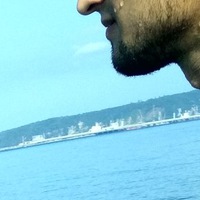когда вдруг обнаружил себя уже погруженным в мир, это значит, что "я" в какой-то момент уже проскользнуло наружу и сцепилось с формой.
когда пропустил мимо внимания такой момент, тогда автоматически принимается "форма" себя, форма схватывается как "я", и этот процесс происходит в обход сознания, это неосознанное подразумевание себя чем-то.
можно сказать, думающий - теневая сторона думаемой мысли. видишь мысль, но чтобы видеть эту мысль, сам становишься мыслью-мыслящим.
но всегда свободен от того, что знаешь прямо, то есть от того, на что внимание было прямо направлено. тогда знаешь - да-да, я вижу это, это не я, котлеты отдельно, мухи отдельно.
но если проследовать за мыслью и увлечься её содержимым, это прямое знание нарушается, и "мыслящий" проникает в зону подразумеваемого, сохраняется в подсознании как косвенная ссылка.
хотя ссылка это только адрес, но подсознание обращается с ним так, как будто адресат действительный.
всё бодрствующее сознание - многоуровневый тёмный лабиринт из таких подразумеваний о себе, где неосвещённые участки - это отождествления себя с чем-то (пониманиями, ощущениями, состояниями), в обход осознания.
более "грубые" уровни лабиринта скрывают всё более "тонкие" уровни.
вход в лабиринт - это также и выход из него, для выхода необходимо вернутся ко входу, ничего не пропуская и не оставляя неосвещенных участков, из которых опять может разрастись эго. спасительная нитка, по которой можно отмотать свой путь обратно до входа - это знание что "я есть".
и да, такое "возвращение" - это "усилие", но усилием это кажется лишь со стороны вовлечённого "я".
в действительности реальность реальна всегда, и такое "возвращение" тоже часть иллюзии. это "усилие" похоже на стоп-кран, то есть по сути это не усилие, но торможение процесса, извлечение "я" из него, освещение его вниманием.
истинных мыслей нет. любая мысль, выраженная в словах, состоянии или ощущении, это письмо на воде.
и если не следовать за тем что мысль предлагает, а развернуть внимание целиком на мыслящий в этот момент субъект, то есть на думающего эту мысль, который говорит "я", тогда прожектор направляется прямо на него, и он растворяется - он и существовал только как игра тени, он подразумевался как само-собой-разумеющееся, но не исследовался на предмет действительности.
если не инвестировать "я" в новые вещи, тогда весь клубок последовательно развяжется сам. мысли будут замечаться, не успев заключить бессознательное соглашение на поставку в них "я".
в самих мыслях нет никаких проблем, но только когда "я" начинает в них ускользать.
в конце будет то же, что и в начале - нерождённое и безусильное состояние, которое и состоянием-то не назвать.
хорошая новость в том, что таких "зацепок" конечное число. рамана сравнивал это с осадой крепости, откуда за едой периодически выходят защитники, и количество защитников ограничено.
когда пропустил мимо внимания такой момент, тогда автоматически принимается "форма" себя, форма схватывается как "я", и этот процесс происходит в обход сознания, это неосознанное подразумевание себя чем-то.
можно сказать, думающий - теневая сторона думаемой мысли. видишь мысль, но чтобы видеть эту мысль, сам становишься мыслью-мыслящим.
но всегда свободен от того, что знаешь прямо, то есть от того, на что внимание было прямо направлено. тогда знаешь - да-да, я вижу это, это не я, котлеты отдельно, мухи отдельно.
но если проследовать за мыслью и увлечься её содержимым, это прямое знание нарушается, и "мыслящий" проникает в зону подразумеваемого, сохраняется в подсознании как косвенная ссылка.
хотя ссылка это только адрес, но подсознание обращается с ним так, как будто адресат действительный.
всё бодрствующее сознание - многоуровневый тёмный лабиринт из таких подразумеваний о себе, где неосвещённые участки - это отождествления себя с чем-то (пониманиями, ощущениями, состояниями), в обход осознания.
более "грубые" уровни лабиринта скрывают всё более "тонкие" уровни.
вход в лабиринт - это также и выход из него, для выхода необходимо вернутся ко входу, ничего не пропуская и не оставляя неосвещенных участков, из которых опять может разрастись эго. спасительная нитка, по которой можно отмотать свой путь обратно до входа - это знание что "я есть".
и да, такое "возвращение" - это "усилие", но усилием это кажется лишь со стороны вовлечённого "я".
в действительности реальность реальна всегда, и такое "возвращение" тоже часть иллюзии. это "усилие" похоже на стоп-кран, то есть по сути это не усилие, но торможение процесса, извлечение "я" из него, освещение его вниманием.
истинных мыслей нет. любая мысль, выраженная в словах, состоянии или ощущении, это письмо на воде.
и если не следовать за тем что мысль предлагает, а развернуть внимание целиком на мыслящий в этот момент субъект, то есть на думающего эту мысль, который говорит "я", тогда прожектор направляется прямо на него, и он растворяется - он и существовал только как игра тени, он подразумевался как само-собой-разумеющееся, но не исследовался на предмет действительности.
если не инвестировать "я" в новые вещи, тогда весь клубок последовательно развяжется сам. мысли будут замечаться, не успев заключить бессознательное соглашение на поставку в них "я".
в самих мыслях нет никаких проблем, но только когда "я" начинает в них ускользать.
в конце будет то же, что и в начале - нерождённое и безусильное состояние, которое и состоянием-то не назвать.
хорошая новость в том, что таких "зацепок" конечное число. рамана сравнивал это с осадой крепости, откуда за едой периодически выходят защитники, и количество защитников ограничено.
when he suddenly found himself already immersed in the world, this means that the "I" at some point had already slipped out and clung to the form.
when such a moment is missed by attention, then the "form" of itself is automatically accepted, the form is grasped as the "I", and this process takes place bypassing consciousness, this is an unconscious self-implication of something.
one can say, the thinker is the shadow side of thought. you see a thought, but in order to see this thought, you yourself become a thinking thought.
but always free from what you know directly, that is, from what attention was directly directed to. then you know - yes, yes, I see this, it's not me, cutlets separately, flies separately.
but if you follow the thought and get carried away with its contents, this direct knowledge is violated, and the “thinker” enters the zone of the implied, is stored in the subconscious as an indirect reference.
although the link is only an address, the subconscious mind treats it as if the addressee is valid.
all waking consciousness is a multi-level dark labyrinth of such self-implications, where unlit areas are identifications of oneself with something (understandings, sensations, conditions), bypassing awareness.
the rougher levels of the labyrinth hide the increasingly finer levels.
the entrance to the labyrinth is also the way out of it; to exit it is necessary to return to the entrance, not missing anything and not leaving unlit areas, from which the ego can again grow. the saving thread by which you can rewind your path back to the entrance is the knowledge that "I am."
and yes, such a "return" is an "effort", but it seems an effort only from the side of the involved "I".
in reality, reality is always real, and such a “return” is also part of the illusion. this "effort" is similar to a stop-crane, that is, in fact, it is not an effort, but braking of the process, removing the "I" from it, lighting it with attention.
there are no true thoughts. any thought expressed in words, condition or sensation is a letter on the water.
and if you do not follow what the thought suggests, but turn your attention entirely to the subject thinking at that moment, that is, to the thinker who thinks this thought, who says “I”, then the spotlight goes directly at him, and he dissolves - he existed only as a play of shadow, it was meant as a matter of course, but was not investigated on the subject of reality.
if you do not invest “I” in new things, then the whole tangle will consistently unfold itself. thoughts will be noticed, not having time to conclude an unconscious agreement for the supply of "I" in them.
there are no problems in the thoughts themselves, but only when the "I" begins to slip away into them.
in the end it will be the same as in the beginning - an unborn and non-reinforcing state that cannot be called a state.
the good news is that there are a finite number of such clues. Ramana compared this to the siege of the fortress, from where defenders periodically go out for food, and the number of defenders is limited.
when such a moment is missed by attention, then the "form" of itself is automatically accepted, the form is grasped as the "I", and this process takes place bypassing consciousness, this is an unconscious self-implication of something.
one can say, the thinker is the shadow side of thought. you see a thought, but in order to see this thought, you yourself become a thinking thought.
but always free from what you know directly, that is, from what attention was directly directed to. then you know - yes, yes, I see this, it's not me, cutlets separately, flies separately.
but if you follow the thought and get carried away with its contents, this direct knowledge is violated, and the “thinker” enters the zone of the implied, is stored in the subconscious as an indirect reference.
although the link is only an address, the subconscious mind treats it as if the addressee is valid.
all waking consciousness is a multi-level dark labyrinth of such self-implications, where unlit areas are identifications of oneself with something (understandings, sensations, conditions), bypassing awareness.
the rougher levels of the labyrinth hide the increasingly finer levels.
the entrance to the labyrinth is also the way out of it; to exit it is necessary to return to the entrance, not missing anything and not leaving unlit areas, from which the ego can again grow. the saving thread by which you can rewind your path back to the entrance is the knowledge that "I am."
and yes, such a "return" is an "effort", but it seems an effort only from the side of the involved "I".
in reality, reality is always real, and such a “return” is also part of the illusion. this "effort" is similar to a stop-crane, that is, in fact, it is not an effort, but braking of the process, removing the "I" from it, lighting it with attention.
there are no true thoughts. any thought expressed in words, condition or sensation is a letter on the water.
and if you do not follow what the thought suggests, but turn your attention entirely to the subject thinking at that moment, that is, to the thinker who thinks this thought, who says “I”, then the spotlight goes directly at him, and he dissolves - he existed only as a play of shadow, it was meant as a matter of course, but was not investigated on the subject of reality.
if you do not invest “I” in new things, then the whole tangle will consistently unfold itself. thoughts will be noticed, not having time to conclude an unconscious agreement for the supply of "I" in them.
there are no problems in the thoughts themselves, but only when the "I" begins to slip away into them.
in the end it will be the same as in the beginning - an unborn and non-reinforcing state that cannot be called a state.
the good news is that there are a finite number of such clues. Ramana compared this to the siege of the fortress, from where defenders periodically go out for food, and the number of defenders is limited.
У записи 10 лайков,
1 репостов.
1 репостов.
Эту запись оставил(а) на своей стене Михаил Медведев






























